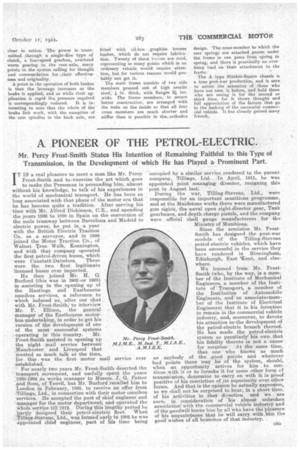A, PIONEER OF THE PETROL-ELECTRIC.
Page 45

If you've noticed an error in this article please click here to report it so we can fix it.
Mr. Percy Frost-Smith States His Intention of Remaining Faithful to this Type of Transmission, in the Development uf which He has Played a, Prominent Part.
IT IS a real pleasure to meet a man like Mr. Percy Frost-Smith and to 'exercise the art which goes to make the Pressman in persuading him, almost without his knowledge, to talk of his experiences in the world of mechanical transport. He has been so
long associated with that phase of the motor era that he has become quite a tradition. After serving his time with Mr. Alfred Dickinson, C.E., and spending
the years 1896 to 1898 in Spain on the conversion of the mule tramway between Barcelona and Madrid to electric power, he put in a year with the British Electric in, Co. as a surveyor, and in 1899 joined the Motor Traction Co., of Walnut 'Tree Walk, Kennington, and with that company operated the first petrol-driven buses, which
were Canstatt-Daimlers. These were the two first legitimate lioensed buses ever imported.
He then joined Mr. H. G. Burford (this was in 1902 tor 1903) in .assisting in the opening up of the Hastings and Eastbourne omnibus services, a reference to which induced us, after our chat with Mr. Frost-Smith, to interview Mr. P. Ellison, the general manager of the Eastbourne motorbus undertaking, in order to get his version of the development of one of the most successful systems operating in this country. Mr. Frost-Smith assisted in opening up the night mail service between* Manchester and Liverpool that created so much talk at the time, for this was the first motor mail service ever established.
For nearly two years Mr. Frost-Sniith. deserted the transport movement, and usefully spent the years 19M-1904 as works manager to Messrs. J. G. Putter and Sons, of Yeovil, but Mr. Burford recalled him to London in February, 1905, to receive an offer from Tailings, Ltd., in connection with their motor omnibus services. He accepted the post of chief engineer and manager for the motor department, and operated the whole service till 1912. During this lengthy period he partly designed their petrol -electric fleet. When Tilling-Stevens, -Ltd., was formed early in 1202 he was appointed chief engineer, part of his time being Mr. Percy Frost-Smith, M.I.M.E., M. Inst. T.,
occupied by a similar service rendered to the parent company, Tillings, LW. In April, 1915, he was appointed joint managing 4:rector, resigning this post in August last. During the war, Tilling-Stevens, Ltd., were responsible for an important munitions programme, and at the Maidstone works there were manufactured gun sights, the naval open sight-director gear, Tank gearboxes, and depth charge pistols, and the company were official shell gauge manufacturers for the Ministry of Munitions.
Since the armistice Mr. FrostSmith has designed the post-war models of the Tilling-Stevens petrol-electric vehicles, which have been successful in the service they have rendered in Birmingham, Edinburgh, East Kent, and elsewhere.
We learned from. Mr. FrostSmith (who, by the way, is a member of the Institute of Mechanical Engineers, a member of the Institute of Transport, a member of the Institution of Automobile Engineers, and an associategmentber of the Institute of Electrical Engineers) that it ifiL his intention to remain in the commercial vehicle industry, and, moreover, to devote his attention to-the development of the petrol-electric branch thereof. He has made the petrol-electric system so peculiarly' his own that his fidelity thereto is not a cause for surprise At the same time, that one who knows as much as anybody of the good po:nts and whatever bad points there may be of the system, should, when an oPportunity arrives for him to continue with it or to forsake it for some other form of transmission, determine to carry, on with it is proof positive of his conviction °fits superiority over other forms. And that is the opinion he actually expresses, so we shall not be surprised to,hear, in a, short time, of his activities in that de.re•ction and we are care, in consideration of his almost unbroken association with the commercial vehicle industry and of the goodwill borne him by all who have the pleasure of his acquaintance that he will carry with .him the good wishes of all branches of that industry. .




















































